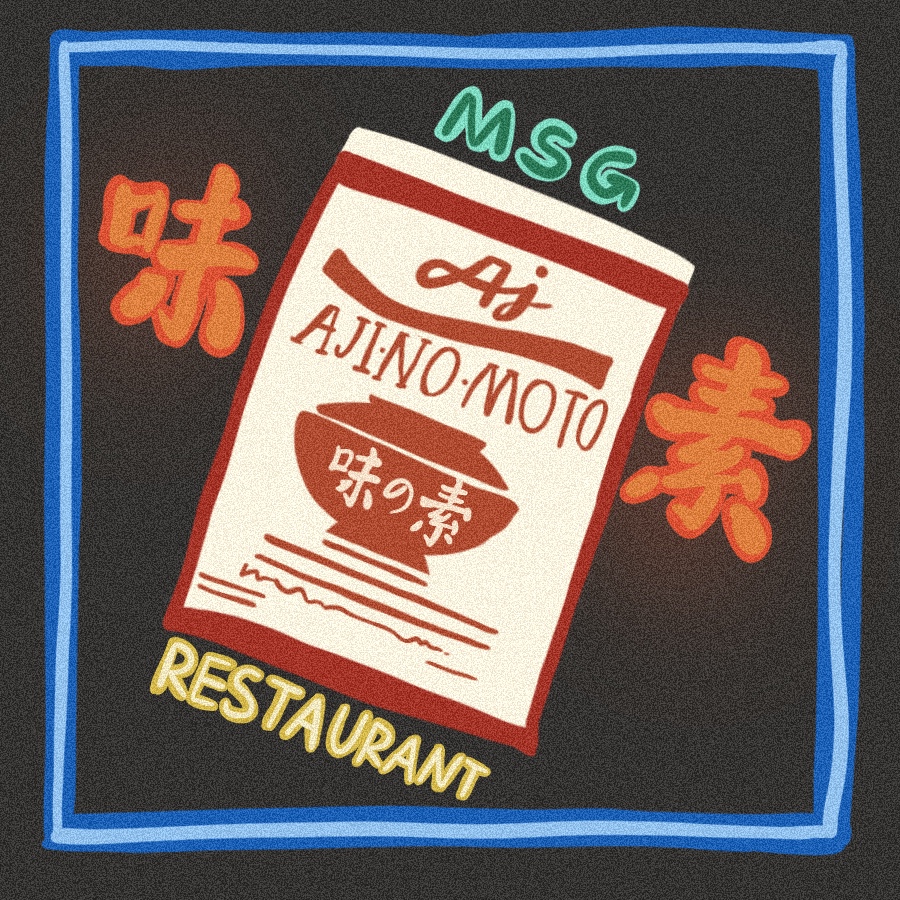Walking through any Chinatown in the United States, you will undoubtedly encounter many signs outside of restaurants that read “NO MSG.” If you have heard the term “MSG,” you are likely aware of the negative perceptions surrounding it. For decades, monosodium glutamate, commonly known as MSG, an ingredient often found in Chinese recipes, has been associated with harmful health implications—and, more broadly, anti-Asian attitudes in the United States. More recently, however, there has been a shift in the anti-MSG tide—a shift that is reflective of a larger acceptance of Asian culture in the United States.
MSG is a widely used seasoning that enhances flavors in food by bringing out the taste sensation of umami, which is commonly referred to as the fifth basic taste. The anti-MSG craze in the United States began in 1968, when the New England Journal of Medicine published a letter by pediatrician Dr. Ho Man Kwok titled “Chinese Restaurant Syndrome,” detailing possible reasons for his sense of “numbness” after eating at American Chinese restaurants. The letter only mentioned MSG once, and yet, journalists jumped at the opportunity to publish sensationalist articles warning against the ingredient, particularly affecting Chinese restaurants. Hyperbolic journalism led to decades of flawed scientific research seemingly proving that MSG was harmful to human health, most of which has since been debunked.
Nowadays, despite its bad rap, MSG is commonly found in everyday American foods, including deli meats, frozen meals, and potato chips. This indicates that anti-MSG attitudes cannot be entirely health-related. Otherwise, MSG in all food types would be targeted. Given the prevalence of MSG in many foods, it does not make sense that Asian restaurants, particularly Chinese establishments, would find it necessary to announce that their food contains “NO MSG” unless we examine the history of the anti-MSG movement. The anti-MSG craze is not just about food; it is about race, too. The push toward not using MSG was prompted by anti-Asian rhetoric from the 1960s that also particularly affected Chinese communities.
In the post-Covid-19 era, however, the tide against MSG and Asians more broadly has been turning. New scientific research debunks long-established MSG myths, and some scientists have even begun studying how MSG could be good for human health, serving as a tool to reduce sodium intake. In this era, American perceptions of MSG are generally transitioning from negative to neutral, or even positive. Much like the connection between anti-MSG sentiments and anti-Asian racism, the change can be linked to a shift in perceptions of Asian culture in the United States. Since long before Covid-19, Asian immigration to the United States has risen, and thus, American contact with Asian culture has been increasing. In the past few years, American interest in and consumption of Korean and Japanese popular culture has skyrocketed. Interestingly enough, Chinese pop culture has not seen the same surge. Instead, it is often either mislabeled or entirely absent from the picture. Yet, Asian American culture has become broadly more accepted. The parallels between a reduction in anti-MSG messaging and increased American interest in Asian culture can be explained simply by a growing Asian presence in America. However, the tension surrounding Chinese people and culture shows that, while anti-MSG arguments have been reduced or debunked, the reversal of racist rhetoric is nowhere near complete, especially for American Chinese communities who have been particularly impacted by rhetoric surrounding MSG and Covid-19.
Anti-Asian discrimination has permeated well into the 21st century. The most obvious exhibition was seen at the height of the Covid-19 pandemic, when anti-Asian incidents ranging from taunts to violent assaults saw a noticeable increase. Politicians seeking office have weaponized anti-China rhetoric, which adversely equates Chinese Americans to the actions of the Chinese government. This conflation of Chinese Americans and the Chinese government has impacted how politicians and many Americans view China not only in relation to the Covid-19 pandemic but also as a whole. As China is seemingly seen more as a “threat,” the repercussions are widespread. Though acceptance of Asian culture has been affected by events like the Covid-19 pandemic and an increased mistrust in the Chinese government, there has been real progress that cannot be forgotten.
The story of MSG in the United States is a twisted, ongoing example of xenophobia and racism that has largely been brushed under the rug. Fortunately, recent trends show that attitudes are changing positively. Ultimately, the evolving narrative surrounding MSG is reflective of a broader socioeconomic shift from baseless xenophobia and economic concerns to a more accepting embrace of Asian culture, marking a hopeful step toward dismantling long-standing prejudice.
